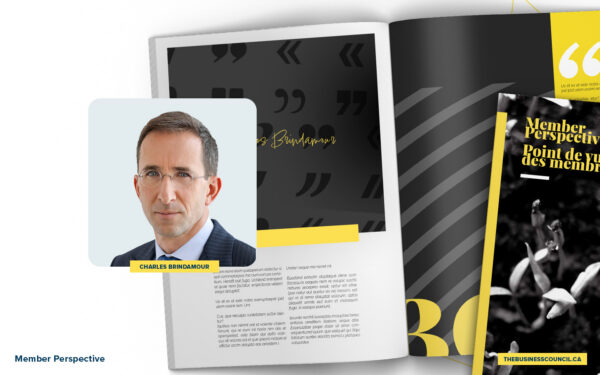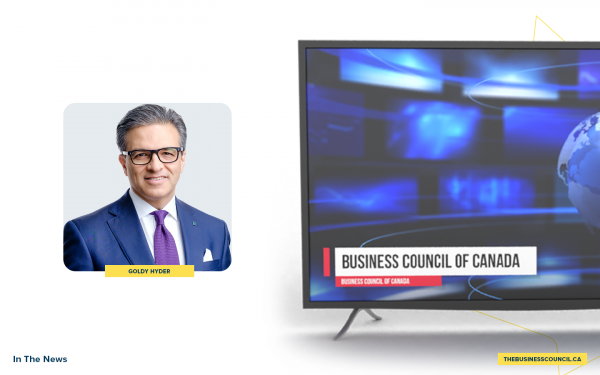Canadians would be wise to listen to what the U.S. ambassador has to say
As published in The Globe and Mail
Ambassador Pete Hoekstra, the United States’ top diplomat to Canada, has come under fire for being undiplomatic. But this criticism is misguided. At a time when Canadian workers and business leaders face unprecedented uncertainty, we need more candour, not less.
Since arriving in Canada, Mr. Hoekstra has taken part in multiple panels, podcasts, and press interviews, and has been unfailingly frank in explaining U.S. President Donald Trump’s thinking. That’s his job. His role as ambassador is to faithfully reflect his government’s positions.
He’s also met privately with Canadian entrepreneurs and business owners, and visited factory floors across the country, including industries affected by U.S. tariffs. As they can corroborate, what he says in front of cameras is what he says behind closed doors.
First, Mr. Hoekstra insists we can still secure a deal to reduce U.S. tariffs on Canadian exports. To do so, he points to the framework agreements the U.S. has struck with Britain, the European Union, Japan and South Korea – which he describes as “illustrative.”
Second, he cautions us not to confuse or conflate tariff deals with the coming review of the U.S.-Mexico-Canada Agreement. The risk is this could delay or derail the renewal of the USMCA, which would pose an existential threat to our economy.
When offering these observations, Mr. Hoekstra is always quick to insist he’s simply sharing information; what Canadians choose to do with it is entirely, and appropriately, left up to us. We’d be wise to give his assessments the added weight they’re due.
Few people have the direct line to Mr. Trump that Mr. Hoekstra earned by leading the President’s successful election campaign in the battleground state of Michigan. Even his harshest critics can’t credibly suggest he lacks access to the Oval Office.
Canadians have in Mr. Hoekstra a U.S. ambassador who not only understands Mr. Trump and his world view, but is willing to give us an honest and accurate assessment of where we stand as we begin the process to extend our most important trade agreement.
Of course, it goes both ways. It’s equally important that Mr. Trump has an accurate understanding of our views, which underscores another, often-neglected, part of Mr. Hoekstra’s job: reporting to Washington what he hears and sees in Canada.
We’ve become so consumed with what Mr. Hoekstra has been saying to Canadians that we’ve lost sight of something arguably more significant: What is he saying to Americans? What messages have we been giving him to communicate back home?
It stands to reason Mr. Hoekstra has shared with the White House what he said recently in Halifax: that “it is very, very difficult to find Canadians who are passionate about the America-Canada relationship.” If so, this should be cause for concern.
We need Canadian champions for the USMCA and the highly integrated and extremely prosperous economic partnership we’ve built with the United States and Mexico. Despite everything, other countries would happily trade places with us in a heartbeat.
As Prime Minister Mark Carney might say, Canada has what the world wants.
Of course, it’s tough to feel optimistic or enthusiastic about any of that if you’ve lost or fear losing your job, or are worried about the future of your business. Perhaps a more realistic goal, then, isn’t for us to be passionate about the Canada-U.S. relationship, but to be dispassionate.
Many things have changed this year, but two haven’t: geography and math. Those highly integrated supply chains run north and south, and the undeniable truth is no amount of trade diversification can replace the value and volume of goods they carry – not in our lifetime.
It’s also true that there’s a scenario, as strange as it may seem to some, in which we come out on the other side of the current tariff dispute and next year’s USMCA review with the opportunity and desire to increase the trade and investment that flow across our shared continent.
The stakes for the USMCA review are therefore too high for empty platitudes or conventional niceties. Political and business leaders need to be open, honest and direct with Canadians – and we should avoid personal attacks on the people who already are.
Latest Opinion
In the age of economic sovereignty, business can’t sit on the sidelines
February 24, 2026











